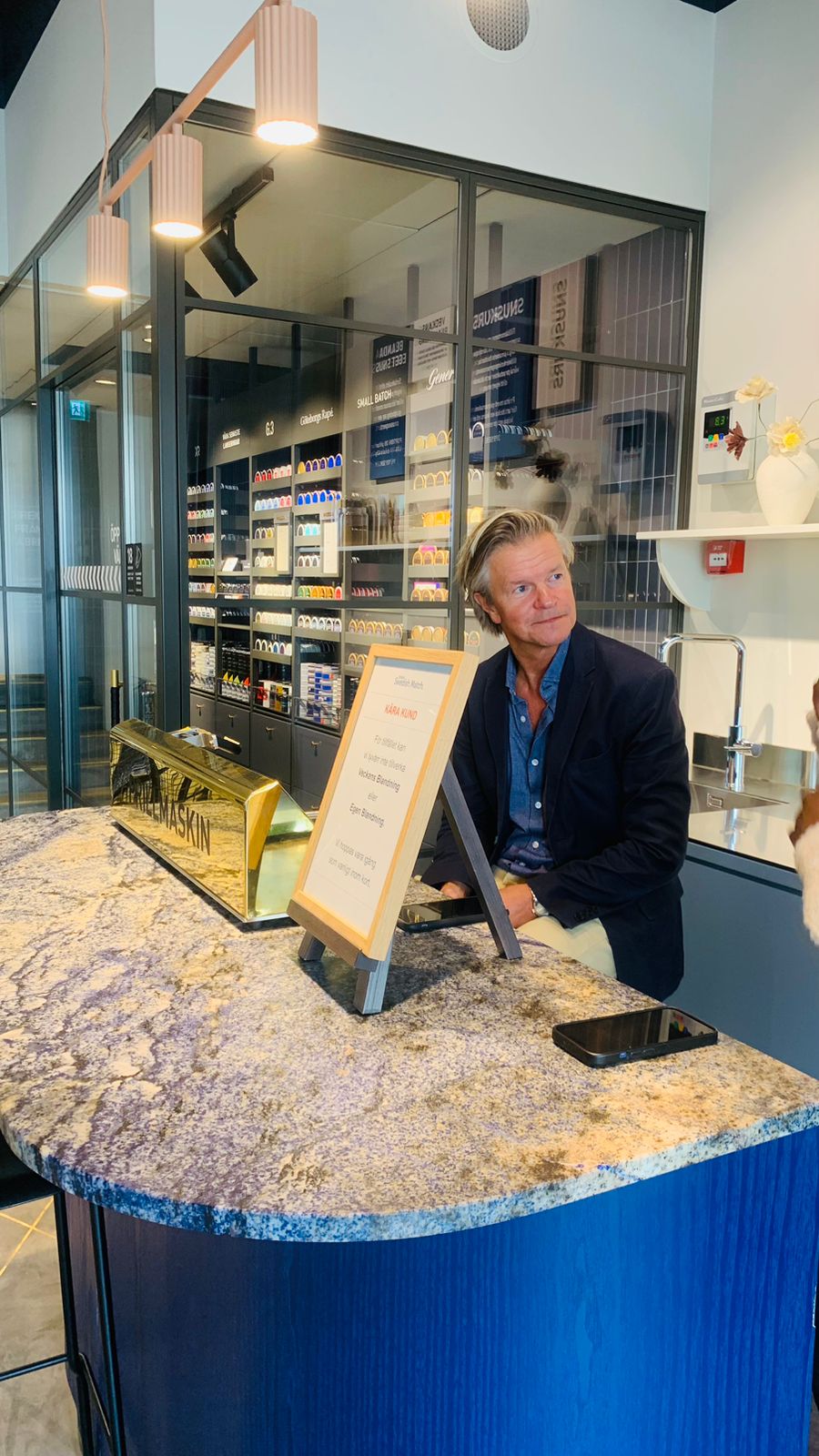…Sweden records immense results from tobacco harm reduction initiatives
Promise Marupeng recently in Sweden
A tradition of snuff/snus cultivation and oral intake emanating from the 1560s has become Sweden’s pride in contributing to global tobacco harm reduction, saving European countries the burden of smoking-related illnesses.
A folkloric story told to travellers has it that Queen Catherine de Medic of France , suffered from continuous migraines in 1561, until she took snuff nasally on the advice of a doctor called Jean Nicot who recommended clay snuff to her.
The queen is said to have been cured of the headaches gradually as she took the snuff, and the word has spread since then, creating a culture of adopting the product for medicinal use, while locals also expanded to spiritual and self-stimulation usage.
In 2019, a delegation of South African health experts even travelled to Sweden to learn about their innovative harm reduction and tobacco control approaches and returned very impressed.

used to harvest tobacco and produce snus/ snus.
All pictures by Promise Marupeng
This also became part of an adopted campaign by Philip Morris International (PMI), a leading tobacco company, to find safer alternatives to creating a smoke-free world as a requirement of the World Health Organisation’s goal to create a smoke-free world by 2030.
In February 2023, PMI decided to buy the world’s largest snus and oral nicotine manufacturer, The Swedish Match, to accelerate their goal of creating a smoke-free community and offering safer alternatives to the use of tobacco and nicotine by smokers to lower smoke-related illnesses due to tobacco usage and the passing of second-hand smoke to non-smokers.
Stockholm and Gothenburg – My Swedish Experience
During my visit, I met with Patrick Hildingsson, the vice president for public affairs at Swedish Match in Stockholm and Gothenburg. The company is the largest Snus and Zyn nicotine pouch manufacturer in Sacanadavia, developing, manufacturing, and selling leading smoke-free products, cigars, and lights.
Hildingsson explained how Sweden’s “harm reduction” strategy had significantly declined smoking rates, with Swedes accounting for a very low prevalence of just about 5% of smoking citizens out of its population.
“The approach of using nicotine pouches and snus focused on providing safer alternatives to cigarettes, like (a type of smokeless tobacco) and e-cigarettes.

“Swedes don’t smoke, only foreigners do,” says Hildingsson.
“Using an example of a group of people queueing at the train stop central station in Gothenburg city, six in 10 Swedes have a nicotine pouch stuffed up their upper lip as a replacement for cigarettes,” and you won’t even tell because it’s orally taken without any smoke,” Hildingsson adds.
Combustion is an environmental health and physical health problem
In Sweden, smoking cigarettes has been banned in enclosed public areas since May 2005, with the government providing designated areas for smokers to engage in their habit without passing, secondary smoke to people who don’t smoke, and providing a combustion-free environment for everyone, according to the World Health Organisation.
Hildingsson says, the use of snus, and snuff is popular as opposed to the traditional heated tobacco products like cigarettes.
South Africa, which has a smoking prevalence of just under 30% has been impressed by this approach, according to the WHO, seeing an opportunity to apply similar strategies to their own country. Officials say they have learned how Sweden’s approach has: Reduced smoking rates among youth, decreased tobacco-related illnesses, and increased public awareness about tobacco harm.
Global health experts say the country with the highest tobacco usage is Nairu which stands at 48% followed by countries like Myanmar, Kiribati, Papua New Guinea, and Serbia at 40% while France is at 35%.
According to Hildingsson, South Africa has implemented a similar harm reduction programme, incorporating snus and e-cigarettes as alternatives to traditional tobacco products. They also launched a nationwide smoke-free campaign, promoting education and awareness about the dangers of tobacco use.

during an educational tour for South African media
The results were remarkable. Director of smoke-free products Jonathan Kwak for Philip Morris International, a company that bought the Swedish Match in 2023, says the buying of the cigarette manufacturer is one of the interventions the tobacco legend PMI, since 2008 undertook to accelerate its aim to achieve a smoke-free product distribution and safer alternatives to smokers and those who want to quit smoking permanently.
“Smoking rates among South African youth declined by 20% within two years. Tobacco-related illnesses decreased by 15%, while public awareness and support for smoke-free initiatives increased significantly,” Kwak says.
Kwak says the introduction of Zyn nicotine pouches to the South African market has had overwhelming results, with consumers switching to nicotine pouches in their smoke-quitting journey.
“Zyn is already available in all major retail stores, kiosks, hotels, bars, and hypermarkets in all South African provinces,” he adds.
South Africa’s success has been attributed to the adoption of Sweden’s harm reduction strategy, demonstrating the power of international collaboration and knowledge-sharing in public health.
Many more things to learn from Sweden
In the picturesque city of Stockholm, a vibrant culture of walking and cycling thrives, making citizens healthy and fit. Citizens of all ages pedal or stroll through the city’s scenic streets, enjoying the fresh air and scenic views. This love affair with exercises is more than just a hobby; it is a way of life.
Kwak says Sweden’s commitment to sustainable transportation dates back to the 1970s when the government invested heavily in bike-friendly infrastructure. Today, over 60% of Stockholm’s residents cycle or walk to work or school.

evolved over time
The impact on public health has been remarkable.
- Obesity rates have been reduced, with only 13% of adults considered obese.
- Cardiovascular disease decreased by 30% over the past decade.
- *Air quality improved significantly, reducing respiratory issues.
Kwak says Sweden has also pioneered oral nicotine products, like snus, as a harm reduction alternative to smoking. This strategy proved highly effective smoking rates dropped to an impressive 5%, one of the lowest in Europe.
More from Africa News 24
Former Kosovo president Atifete Jahjaga advocates free press
“Tobacco-related illnesses decreased by 40% since 2000, while Snus users reported improved oral health and reduced nicotine cravings.
Dr Maria Mitchell a public health expert, explained: “Our approach focuses on pragmatic solutions. We understand that quitting nicotine entirely can be challenging. Oral nicotine products provide a safer alternative, reducing harm and improving overall health.”
The Swedish healthcare system benefited greatly:
Mitchell says reduced healthcare costs, meaning lower rates of smoking-related illnesses, continue to save the health system millions.
“This has also ensured increased productivity in citizens’ improved health, which led to reduced absenteeism, and increased work productivity. Now Swedes enjoy a better quality of life, contributing to a thriving society.
As the world grapples with tobacco control and sustainable transportation, Sweden stands as a shining example. Its walking and cycling culture, combined with innovative harm reduction strategies, created a healthier, more sustainable nation.
Inspired by Sweden’s success, other countries have began adopting similar approaches. The Swedish model has proven that small changes in daily habits could add up to significant improvements in public health.












